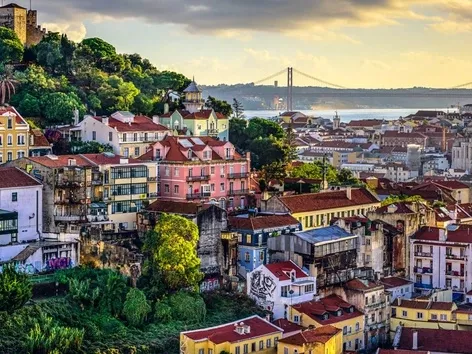Portugal Digital Nomad Visa: benefits, requirements and application procedure in 2024
Table of contents
- What is Portugal Digital Nomad Visa?
-
Advantages of Digital nomad visa Portugal
- 1. Ability to live and work in Portugal legally for up to 5 years (with extension).
- 2. The right to visa-free travel within the Schengen area (26 European countries).
- 3. Access to the Portuguese health and social security system.
- 4. Lower tax rates under the Non-Permanent Resident (NHR) program (optional).
- 5. Path to permanent residence permit and Portuguese citizenship after 5 years.
- 6. Simple registration procedure.
- 7. EU citizenship for newborn children.
- Types of Portuguese Digital Nomadic Visas
- Portugal Digital Nomad Visa requirements
- Can a digital nomad move to Portugal with his family?
- The procedure for applying for a digital nomadic visa in Portugal
- Do digital nomads pay taxes in Portugal?

The Digital Nomad Visa in Portugal allows remote workers from non-EU countries to live and work in the country. Foreigners who have an appropriate level of income can get a permit. Find out who can apply for a D8 visa and what the requirements are for future workers
The D8 visa or digital nomadic visa in Portugal allows remote workers and freelancers to obtain a residence permit in the country. Portugal introduced this visa in 2022, and since then the visa has gained great popularity among expats.
As of 2024, over 2,600 visas have been issued to digital nomads moving to Portugal. American digital nomads received the most visas, followed by Brazilian and British remote workers, and the permit is also popular among citizens of Lebanon, Russia and Bangladesh.
What are the requirements for remote workers in Portugal? What is the procedure for obtaining a Digital Nomad Visa in Portugal in 2024? We tell.
What is Portugal Digital Nomad Visa?
The D8 visa, officially known as the “Temporary residence visa for professional activities granted remotely outside the national territory”, allows citizens of non-EU/EEA countries with remote work to live and work in Portugal for one year, with the possibility of renewing the permit and even the prospect of obtaining a permanent residence permit after five years.
Advantages of Digital nomad visa Portugal
1. Ability to live and work in Portugal legally for up to 5 years (with extension).
The Portuguese digital nomad permit allows a long-term stay in Portugal, in comparison, a digital nomad visa in Croatia allows you to stay in the country for a maximum of one year, while the Portuguese tourist visa only allows a 90-day stay.
2. The right to visa-free travel within the Schengen area (26 European countries).
Given that Portugal is part of the Schengen Area and the EU, holders of the Portuguese Digital Nomadic Visa are entitled to short visits to other member countries of up to 90 days every 6 months.
3. Access to the Portuguese health and social security system.
Digital nomads and their families can access services from the Portuguese education and healthcare system while living in Portugal. Public health care is affordable and comprehensive. Educational institutions in Portugal, including universities, are well-regarded and accessible to residents.
4. Lower tax rates under the Non-Permanent Resident (NHR) program (optional).
5. Path to permanent residence permit and Portuguese citizenship after 5 years.
Digital nomads can obtain a Portuguese passport if they spend more than five years in the country and integrate with the local culture. In order to apply for citizenship, it is necessary to pass a Portuguese language test.
6. Simple registration procedure.
In general, to obtain a permit, it is sufficient for the applicant to demonstrate that he has a remote job with an appropriate level of income.
7. EU citizenship for newborn children.
If a child is born in Portugal to parents who have lived in the country for at least one year on the basis of a residence permit, the newborn child automatically becomes a citizen of Portugal.
Portugal is a great destination for expats because of its affordable cost of living, good weather and rich culture. What kind of budget you need to have to live in Portugal in 2024, read in this article.
Types of Portuguese Digital Nomadic Visas
Portugal's Digital Nomad Visa has two options:
1. Visa for temporary stay - without the right to obtain a residence permit.
This type of permit is valid for 1 year and allows multiple entry into the country. However, it does not entitle the expat to apply for a residence permit and cannot be extended.
2. Resident visa - with the right to obtain a residence permit, and then citizenship.
A long-term visa is valid for four months and allows you to obtain a residence permit for two years upon arrival in Portugal, with the possibility of an extension for another three years. After five years, this permit can become the basis for obtaining a permanent residence permit in Portugal or citizenship.
The procedure and package of documents for issuing each type of visa is similar. The only difference is that long-term visa holders must visit Portugal's Immigration and Border Protection Service within 4 months of arrival to apply for a residence permit, while temporary visa holders do not.
Portugal Digital Nomad Visa requirements
To obtain a digital nomadic visa to Portugal, the applicant must meet the following requirements:
- You must be over 18 years old.
- You must have citizenship in non-EU and EEA countries.
- You will have fully remote work on an open-ended contract or freelance.
- You will confirm a total income from all sources of at least €3,280 per month.
- You must show that you have housing in Portugal, for example, provide a 1-year apartment rental agreement.
Can a digital nomad move to Portugal with his family?
A digital nomad who gets a visa can move to Portugal with their close relatives. This applies to the applicant's spouse, children under 18 and parents over 65 or younger if they are financially dependent on the main applicant.
Children between the ages of 18 and 30 can also be included if they are unmarried and financially dependent on the applicant parents.
What to see in Portugal? Detailed travel guide to Portugal from Visit World for the link.
The procedure for applying for a digital nomadic visa in Portugal
Step 1 – Check for eligibility
Make sure you meet the requirements for a monthly income of at least €3,280 and can prove that you have a remote work arrangement.
Step 2 – Prepare the necessary package of documents for obtaining a visa D8 Portugal
Collect all the necessary documents:
- Valid passport.
- Passport photos (4.5x3.5 cm).
- Contract or partnership agreement confirming remote work.
- Bank statements showing monthly income and savings.
- Confirmation of a place of residence in Portugal (for example, an apartment rental agreement).
- Health insurance in Portugal.
- Certificate of no criminal record translated into Portuguese.
- NIF (Portuguese tax identification number) registration certificate.
- A letter in English explaining why you are moving to Portugal.
You will need health insurance to safely move and find employment in a new country. You can issue an extended policy on our website using the link.
Step 3 – Visa application
Fill out the visa application form, which can be obtained from the Portuguese consulate or embassy.
Step 4 – Submit your application
Make an appointment at the Portuguese consulate or embassy. After that, you can submit the application along with the required documents.
Step 5 – Wait for confirmation
Processing time may vary. You will be notified when your application has been approved.
Step 6 – Issuance of a visa
If your application is approved, the visa will be stamped in your passport, allowing you to travel to Portugal.
Step 7 – Head to Portugal
If you have a long-term visa, apply for a residence permit before your visa expires on arrival.
Do digital nomads pay taxes in Portugal?
The type of visa a digital nomad uses to enter Portugal does not determine their tax liability in the country. Instead, tax obligations are determined by the status of a tax resident.
A foreigner obtains the status of tax resident of Portugal if he spends more than 183 days in the country per year. As a tax resident, you will be subject to Portuguese income tax on your worldwide income. Income tax rates in Portugal range from 14% to 48% depending on the amount of income received.
That's why we advise all digital nomads to make sure you comply with Portugal's tax laws. This includes registering with your local tax authority, filing your annual tax return and paying any taxes. Failure to comply with these requirements may result in penalties and interest.
Portugal often tops the rankings of the best countries for digital nomads, with the country recently ranked sixth in the Global Remote Work Index among the top 10 places to work remotely, so moving here will be a great step in your career.
We will remind you! A Portuguese D7 visa can be obtained by financially independent foreigners with passive income. This permit gained particular popularity after the abolition of the "golden visa". We have already told you what conditions for obtaining a Portuguese D7 visa are relevant in 2024.
Igor Usyk - Head of Legal Department at Visit World
For safe relocation to Portugal, obtaining refugee status and employment, use the advice of an international lawyer.
We help to solve complex and simple issues for your comfort and safety in Portugal.
We monitor the accuracy and relevance of our information. Therefore, if you see any error or discrepancy, please write to our hotline.
Frequantly
asked questions
What salary do you need to have to get a digital nomad visa in Portugal?
Can I work remotely in Portugal without a visa?
Is it easy to get a digital nomadic visa in Portugal?
Recommended articles
3 min
Work
The most in-demand jobs in Portugal in 2025-2026
Are you considering Portugal as a permanent place of residence? This country offers excellent employment opportunities for foreigners. Find out more about what the labour market looks like and which jobs are the most sought after in Portugal in 2025-2026
22 Nov. 2025
More details2 min
Work
Internship in Portugal: 14 reasons to upgrade your qualifications abroad
An internship abroad can give you a competitive edge when looking for a job in the future, allowing you to take a fresh look at your specialty and develop skills that you can use for years to come. Read more about the reasons why you should choose Portugal as an internship country below
11 Mar. 2024
More details3 min
Expats
To attract digital nomads, the Turkish government offers them special visas and working conditions. The mandatory requirements include being over 21 years old, working remotely, and earning at least $3000 per month. Learn more about the procedure for applying for a digital nomad visa in Turkey 2024
14 Oct. 2024
More details2 min
Expats
Croatia digital nomad visa 2025: requirements for applicants, registration procedure and benefits
Croatia is one of the European countries that welcomes digital nomads and has even introduced a separate permit for this category of expats. Find out what the procedure for issuing a digital nomad visa is, what documents you need to have and the benefits of the permit
14 Sep. 2025
More detailsAll materials and articles are owned by VisitWorld.Today and are protected by international intellectual property regulations. When using materials, approval from VisitWorld.Today is required.
